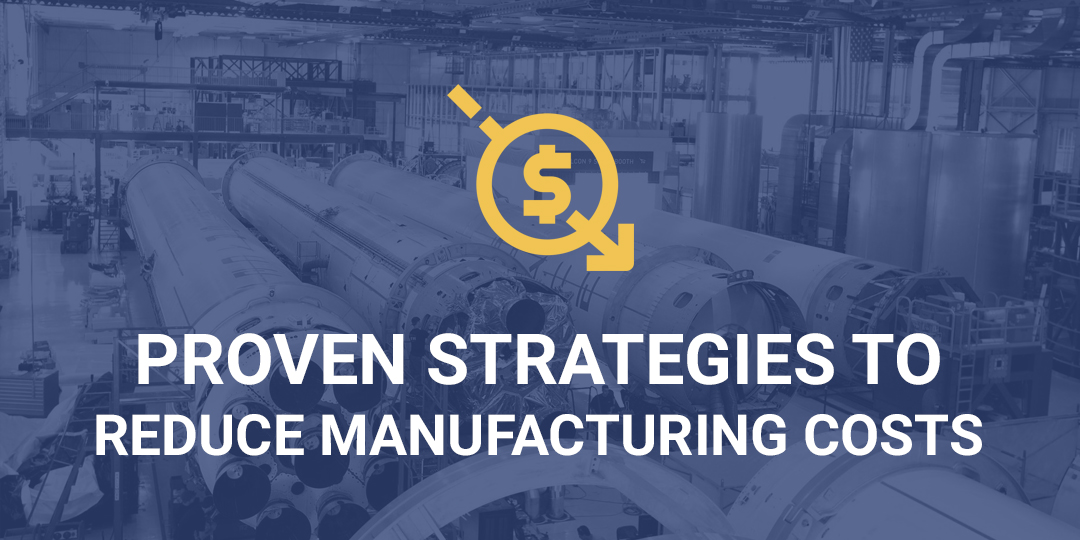
The COVID-19 pandemic has presented industrial manufacturers everywhere with a host of operational and financial challenges. The most common response is to reduce costs, which is part of any good business continuity strategy.
Cutting costs doesn’t have to mean laying off employees, scaling back on operating hours, or passing up on new technology. Those types of cost-cutting typically hurt morale, put innovation on a back burner, and allow competitors to get ahead.
As an alternative to the aforementioned cost-cutting strategies, We’ve outlined six proven strategies that reduce manufacturing costs without harming your workforce or the quality of your product below. Many of these strategies are smaller cost-lowering measures that add up to make a big difference in your bottom line.
1. Cut Your Material Costs
When your company has a reputation for product or service excellence, the last thing you want to do is jeopardize it by investing in cheaper materials. Fortunately, you can cut material costs without resorting to lower-quality alternatives. For example:
Invite quotes from as many suppliers as possible for new materials.
Review all of your product designs to see if you can simplify them.
Use leftover metal and other materials whenever possible.
Monitor the market for any reduction in material prices.
If you have the cash on hand, offer cash payments in return for a cash discount.
Suppliers are often willing to give discounts to customers that have contributed significantly to their turnover. It doesn’t hurt to ask for a turnover discount.
Analyze whether international sourcing makes sense or not. There are additional costs associated with international sourcing, but sometimes sourcing from international suppliers still comes out cheaper even with added costs.
Negotiate long-term supply agreements that include lower material prices.
If you find a lower price for materials you regularly order, ask your current supplier if they will match it. If not, it may be time to look for a more competitive alternative.
2. Monitor Your Inventory
Inventory management can be tricky. Overstocking can increase your storage costs if you don’t end up moving everything. Shortages are just as difficult: they can lead to backorders and unhappy customers.
If you don’t have an inventory management system in place or you’ve been using an antiquated solution for years, you can save on manufacturing costs by investing in a new one. Once inventory tracking is automated, you’ll be able to manage procurement and purchases more efficiently and maintain stock levels that don’t leave you with too much or your customers with too little.
In addition to implementing a better inventory management system, you may also want to consider utilizing the first in first out (FIFO) stock movement system to avoid shrinkage cost. It can be helpful to also implement a regularly occurring quality inspection of stock inventory to avoid pilferage and damage.
3. Automate Manual Processes
If you’ve never used an enterprise resource planning (ERP) solution before, you may be hesitant about making the investment now. However, implementing an automated system can help your manufacturing business reduce operational costs and save money in the long run.
ERP solutions can automate complex processes like employee management, inventory control, purchasing, and budget creation. They also analyze your workflow and identify expensive production issues, making the company -and you- work more efficiently.
4. Eliminate Non-Value-Adding Processes
It’s imperative that your manufacturing process is periodically reviewed to look for deficiencies. Innovations in production occur frequently. In your process review, you may find that there are redundant processes in your manufacturing cycle that are unnecessarily creating added costs.
In order to elevate your manufacturing processes, it helps to be able to view them visually. Tools like Process Street allow you to create visual workflows for procedures so that you can easily analyze and improve upon them. You can also use A/B split testing to verify that a suggested change in process actually reduces costs.
5. Reduce Energy Consumption
Labor costs may be the biggest business expense, but utilities run a close second. If you run a 24-hour manufacturing operation, your monthly energy bills are probably significant.
There are different measures you can take to reduce energy consumption in your facility. They include but are not limited to:
Scheduling production according to demand
Replacing outdated HVAC systems
Installing energy-efficient lighting
Monitoring usage of high-powered machinery
While some strategies may involve an initial expense, they will ultimately reduce manufacturing costs in the long run. It will also give your company the much-valued reputation of being an environmentally-friendly business, which can attract new employees and customers.
6. Enlist Your Employees
Unless you’re a brand-new business, you probably have employees who have been with you for years. Even if you were recently established, you likely have people who have been working in the industry for a long time.
Approach them for ideas on how the company could be doing things more efficiently. Being out on the production floor all day, they may have spotted inefficiencies that you can correct now. If they worked for similar businesses in the past, they can share strategies that worked for their previous employer.
Implementing these types of strategies will help your manufacturing business control costs while continuing to deliver quality output that meets customer demand. Any expenses involved with implementation will soon pay for themselves and help you continue saving money.
About Fintech Industrial Abrasives
At Fintech Industrial Abrasives, we partner with our clients to provide them with affordable and effective abrasive solutions for their finishing needs. Fintech Industrial Abrasives has supplied to some of the largest glass, stone, textiles, woodworking, and metal finishing manufacturers in the country. As a manufacturer, we’re able to construct tailor made sanding belts, sanding discs, sandpaper rolls, and more to fit your needs. For more information about the industries we serve and the products and services we offer, please contact us today!